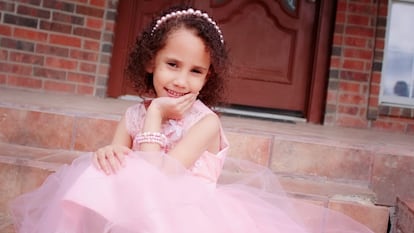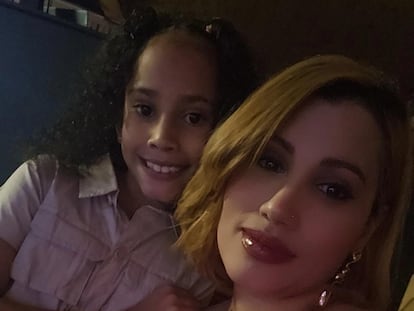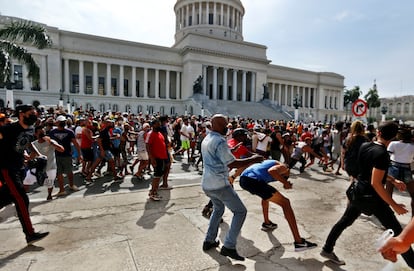Daniela Patricia, a seven-year-old Cuban girl facing the labyrinth of the US immigration courts
The young girl, daughter of one of Cuba’s most well-known dissidents, is caught in a long and grueling legal process to seek asylum and remain with her mother in Texas


They dressed her in a white gown and placed a floral headband over her curly hair. Seven-year-old Daniela Patricia Ferrer Reyes entered the Immigration Court building in Dallas, Texas, as if entering a castle.
“My daughter looked like a princess,” says her mother, Liettys Rachel Reyes. “They praised her so much in court; they told her that’s what she was, a princess. And that’s how I see her.”
The family had left their home in the northern city of Amarillo around 5:00 a.m., just enough time to make the trip to the courthouse where the girl’s first immigration hearing would take place, her first encounter with the U.S. justice system since entering the country in 2022.
At 1:00 p.m. on March 31, Daniela took her seat on the wooden bench in front of the judge. Her mother was then called to sit next to her.
“The first thing the judge asked was for me to explain why the girl had entered the country through the border, why I had taken her out of Cuba,” recalls Reyes, 33.
Reyes, a political activist with the Patriotic Union of Cuba (UNPACU), arrived in the United States when Daniela was just over a year old, in 2019. At the time, Reyes was the wife of José Daniel Ferrer, the most prominent opposition leader in eastern Cuba, who took care of the child while the mother regularized her immigration status in the United States.
As a dissident, Reyes paid the price for standing up to the Cuban regime: she was not only threatened and persecuted for her political beliefs or witnessed the repeated arrests and beatings of Ferrer and other UNPACU members, but she was also banned from leaving the island in 2018 when she was invited to Europe to speak about human rights violations under the then-government of Raúl Castro.
In response to this restriction, she went on a hunger strike along with other activists who were denied the right to leave the country. When she was finally able to travel — and after being warned that she would be imprisoned upon her return — Reyes never went back. She settled in Texas.
That was what she was trying to explain in detail before the Dallas immigration court, with the help of an interpreter and in front of a judge who, according to Reyes, kept interrupting her, searching for inconsistencies, double-checking dates to ensure they were exact.
“They barely let me speak; they interrupted me about six times,” she says. “If the judge was harsh, the translator was even harsher. She told me: ‘Ma’am, please speak more slowly. I don’t understand you. I need you to be concise and precise in what you’re saying.’ They came down hard on me. I can’t even explain how I felt when they started questioning me like that, back and forth, without letting me explain everything my daughter went through in Cuba.”

On the wooden bench, Daniela remained silent, her chin resting on her chest, her head bowed. That Monday, she had to miss school to attend court, a distant and cold place, where there were other children and parents, all nervous, on the verge of collapse. The girl listened attentively, fully aware of what the judge and Reyes were discussing.
At one point, she squeezed her mother’s hand and stared at her, fearful. Reyes told her to stay calm, that everything was fine. “I felt like she was screaming at me, ‘Mom, get me out of here.’ She squeezed my hand as if to ask me to take her away,” her mother says. “She knew what was being discussed, she knew they were talking about deportation, she thought they were going to take her out of the country.”
The judge turned to Reyes once again and asked, “The child remains in the United States illegally. Are you aware that have to choose a country to which she can be deported?”
Reyes didn’t hesitate to respond: “Excuse me, Your Honor, but I do not agree with my daughter being deported to any country, because she is a child,” she said.
Daniela has until November to gather evidence, present a case for political asylum, and return to court with a lawyer to represent her, according to the judge’s order. Her mother has been seeking help to find one — someone who can guide them when Daniela must once again face the justice system.
“My daughter is only seven years old; she can’t defend herself in an asylum case in court,” Reyes insists.
According to the American Immigration Council, many children in recent years have had to navigate their immigration processes without legal representation. Ninety-five percent of minors with attorneys attend their court hearings, but only 33% of those without attorneys appear before a judge — an absence that can later lead to their deportation.
Attorney Jonathan Shaw, who has frequently seen unaccompanied minors before judges, explains that, since it is an administrative process, the government is not required to provide legal representation to minors. “The immigration process is different from criminal proceedings, where the state can provide a lawyer free of charge,” he says. And the high fees attorneys charge today are enough to make some families not even consider hiring one for their children, Shaw adds.
The situation has worsened in recent months after the Trump administration announced it was cutting the $200,000 annually allocated to organizations that offer legal assistance to around 26,000 migrant minors. Although a judge overturned the measure this month, several migrant advocacy groups claim the government has not restored the funds — sending a clear message: among the millions of undocumented people the Republican wants to expel from the country, children are no exception.
The fear of Daniela being deported to Cuba
Before the judge, Reyes did her best to justify why returning Daniela to Cuba was not an option. “She can’t be alone, without her mother. She can’t go back to Cuba because she will be constantly threatened, repressed at school by her own teachers. My daughter is not safe there because her father is not safe there. He was just released from prison two months ago and could be imprisoned again at any moment, because he’s openly fighting the Cuban dictatorship,” the mother insisted.
Until she was four years old, Daniela lived with her father. More than once, she saw him taken to prison, saw their house in the Altamira neighborhood of Santiago de Cuba being raided, saw how constant police surveillance prevented them from moving freely in the city.
There was a day when her father left and never returned. It was July 11, 2021, when Ferrer joined thousands of protesters in the largest anti-government demonstrations Cuba had seen. The opposition leader was released nearly four years later, after the regime agreed to free more than 500 political prisoners following Vatican mediation and a promise from the Biden administration to remove Cuba from the list of state sponsors of terrorism. It wasn’t the first time Ferrer had set foot in Castro’s prison cells: he was one of the 75 prisoners of the so-called Black Spring, released by Raúl Castro in 2010 after talks with the Catholic Church and the Spanish government of José Luis Zapatero.
But for the court, that explanation wasn’t enough. “I don’t know who José Daniel Ferrer is,” the judge replied. Reyes suggested she verify the information online — explaining that the child’s father was one of the most well-known and high-profile Cuban dissidents, whose release had been demanded by numerous international organizations. But the judge was direct and curt: “No, I don’t have to look anything up.”

A short while later, Reyes was outside the courtroom, crying uncontrollably. She was trembling, her lips were pale, and her voice was shaky. “I couldn’t stop, from the frustration, the helplessness,” she says. “In that court, there were so many people being humiliated in front of their children. What you live through there is very intense.”
After her experience at the Dallas court, Reyes fears that, on any given day, the authorities might take Daniela away from her — after everything it took to have her daughter by her side. The mother began preparing for her daughter’s journey when she learned that Ferrer, already in prison, would take a long time to release her.
“My idea was always to get the girl out through family reunification, file a claim, and have her leave Cuba legally,” she says. “We didn’t want her to go through the dangers of crossing the border. But when I saw everything that was happening on the island, I felt terrible — José Daniel was in jail with no sign of being released — so I made the decision to get the girl out with my sister, who was pregnant.”
After a flight to Nicaragua and a journey that took them to Mexico, Daniela and her aunt arrived in the United States on August 21, 2022. Both were admitted into the country under status I-220A, an “Order of Supervision” granted to around 400,000 Cubans upon arrival at the border, which prevents them from benefiting from the Cuban Adjustment Act, which for years has allowed generations of Cubans to regularize their status. This is why young Daniela now has to file a case for political asylum.
It will be a long process, which could take months or even several years — an ordeal for both Daniela and her mother. Among all the questions the Dallas judge asked her, Reyes remembers one with particular clarity: “Do you know that the girl can be deported at any time under my order?” It’s the girl’s biggest fear, Reyes says. “Her greatest fear is that they’ll separate me from her again; she tells me this every night.”
Sign up for our weekly newsletter to get more English-language news coverage from EL PAÍS USA Edition
Tu suscripción se está usando en otro dispositivo
¿Quieres añadir otro usuario a tu suscripción?
Si continúas leyendo en este dispositivo, no se podrá leer en el otro.
FlechaTu suscripción se está usando en otro dispositivo y solo puedes acceder a EL PAÍS desde un dispositivo a la vez.
Si quieres compartir tu cuenta, cambia tu suscripción a la modalidad Premium, así podrás añadir otro usuario. Cada uno accederá con su propia cuenta de email, lo que os permitirá personalizar vuestra experiencia en EL PAÍS.
¿Tienes una suscripción de empresa? Accede aquí para contratar más cuentas.
En el caso de no saber quién está usando tu cuenta, te recomendamos cambiar tu contraseña aquí.
Si decides continuar compartiendo tu cuenta, este mensaje se mostrará en tu dispositivo y en el de la otra persona que está usando tu cuenta de forma indefinida, afectando a tu experiencia de lectura. Puedes consultar aquí los términos y condiciones de la suscripción digital.








































